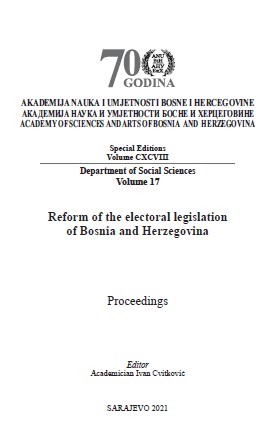Izborni proces u Bosni i Hercegovini: hibridni spoj modernih i zastarjelih rješenja
Electoral System in Bosnia and Herzegovina: Hybrid Mixture of Modern and Outdated Solutions
Author(s): Damir Arnaut
Subject(s): Constitutional Law, Political history, Government/Political systems, Electoral systems, Transformation Period (1990 - 2010), Present Times (2010 - today), ICT Information and Communications Technologies
Published by: Akademija Nauka i Umjetnosti Bosne i Hercegovine
Keywords: Early elections; Instant runoff; Electronic vote counting; Electoral threshold; Malapportionment;
Summary/Abstract: Bosnia and Herzegovina held its first multi-party elections in 1991, and faced a bloody and devastating war the following year. The Dayton Agreement brought peace at the end of 1995, and the first post-war elections were held in 1996, under the auspices of the OSCE. The Electoral Law was adopted by the Bosnia and Herzegovina Parliamentary Assembly in 2001, containing a number of modern, democratic features, such as a fully independent Central Election Commission with no ethnic or entity veto, mandatory gender representation on electoral rolls, automatic voter registration on the basis of ID rolls, and the like. At the same time, several Electoral Law provisions – mandated by Bosnia and Herzegovina’s Daytonwrought Constitution were found contrary to the European Convention on Human Rights by the European Court in Strasbourg, while some others were declared unconstitutional by Bosnia and Herzegovina’s Constitutional Court. These are highly politically-charged matters, resolution of which has been evasive for over a decade in some cases. In the meantime, due to the focus on these politically-sensitive priorities, Bosnia and Herzegovina’s political elites have ignored changes that would dramatically improve legitimacy of elected officials through the introduction of run-off elections, strengthen the integrity of electoral process by way of electronic counting of ballots, as well as increase political stability through the raising of electoral threshold and the introduction of interim elections in situations of political deadlock that prevents government formation. The article discusses all of these matters, providing a comparative perspective, analysis and recommendations.
Book: Reforma izbornog zakonodavstva Bosne i Hercegovine
- Page Range: 28-47
- Page Count: 20
- Publication Year: 2021
- Language: Bosnian, Croatian, Serbian
- Content File-PDF

